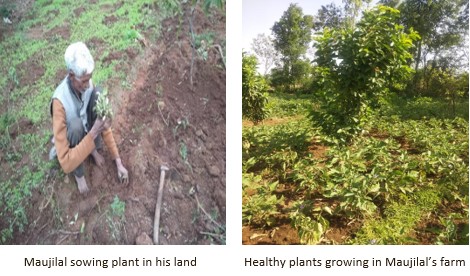|
Maujilal is a small farmholder living in the Khajrah Khurd village with his large 10-member family. He is the sole earning member in his family. His 5-acre land was not fertile and water being scarce in the region, because of inadequate rainfall, made irrigation difficult. As a result, he was barely able to earn INR 30,000 annually. To make ends meet and in search of better economic avenues, Maujilal was forced often to migrate to the city. His children’s education was also affected as they too were forced to work as labourers. But four years ago, Maujilal’s friend told him about a training programme being conducted by Water Harvesting Committee. Maujilal was very excited to hear about this. The next morning, Maujilal and his friend went to the meeting that was being conducted by Development Alternatives at the community platform in the village. The volunteers from Development Alternatives informed him about the training being given to farmers on advanced and vegetable farming.
Maujilal and other participants have learned how 95 plants can be planted on an acre of land. He was given 60 mango saplings and 35 guavas saplings free of cost to plant during the rainy season. In the training, the farmers were also informed that before sowing, they needed to dig 1-meter-deep and 1-meter-long pits in the summer so that any microscopic insects present in the soil would perish from the summer sun. In the initial days, Development Alternatives’ team helped him plant the saplings, but later Maujilal was able to nourish and guard his Wadi independently.
Maujilal believes the Wadi programme has opened new avenues for his children. He says that he loves his plants and takes care of them like his own children. Whenever wild animals eat his plants, he feels very sad. He adds, ‘The experts come to check my plants from time to time and give me additional information. If I had more land, I would have planted more plants and shown them as an example to the whole village. It would have convinced the other farmers that planting trees does not harm farming, but improves the soil condition. I am thankful to Gujar Hunabard and Development Alternatives for making my life easier’.
Rishabh Singh |

 With
the Wadi programme, the farmers no longer need to move to cities as
migrant labourers in search of a better income. Maujilal now earns INR
90,000 annually from his 5 acres of land. His children are studying in
better schools and the family’s living conditions have also improved
considerably.
With
the Wadi programme, the farmers no longer need to move to cities as
migrant labourers in search of a better income. Maujilal now earns INR
90,000 annually from his 5 acres of land. His children are studying in
better schools and the family’s living conditions have also improved
considerably.